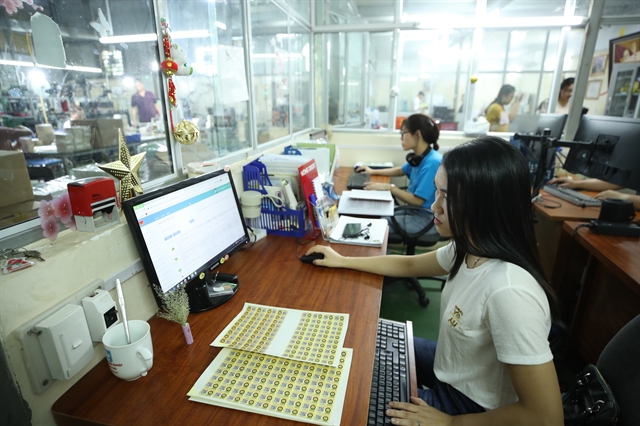 Society
Society

.jpg)
|
| The QR code labelling system at the Centre for Business Integration and Development supports consumers in accessing information about the origin of Hà Nội's agricultural products.— Photo courtesy of the Hà Nội Department of Agriculture and Environment |
HÀ NỘI — Việt Nam's capital city is embracing technology as a key driver for modernising its agriculture sector in the era of global digital transformation.
By promoting agricultural sales via digital platforms, Hà Nội is not only responding to market demands, but also laying the groundwork for long-term competitiveness and sustainability in its agricultural value chains.
In pursuit of a more modern, efficient and sustainable agricultural sector, the city has launched a wide range of high-tech farming models, while also integrating digital tools to strengthen product traceability and market access.
Data from the city’s Department of Agriculture and Environment showed that as of this year, the city has developed 406 high-tech agricultural models, of which nearly 300 have incorporated digital technologies in production management and traceability systems.
The models are concentrated in communes like Gia Lâm, Mê Linh, Đông Anh and Yên Bài as well as in Chương Mỹ Ward.
Director of Trung Giã Agricultural Services and General Business Cooperative Nguyễn Văn Thắng said that the cooperative manages nearly two hectares of vegetables cultivated under VietGAP and organic farming standards.
With an investment of billions of đồng in packaging, labelling and traceability systems, the cooperative now supplies high-quality products to supermarkets and convenience stores.
Since implementing traceability labels, the price of their vegetables has doubled compared to similar products without such certification.
Similarly, Đồng Tâm Livestock and Service Cooperative in Kiều Phú Commune operates a biosecure pig farming system with over 1,000 pigs.
Director of the cooperative Nguyễn Đình Tường said it follows a closed-loop production process from breeding to slaughter, processing and packaging.
Its pork products, labelled under the 'Quốc Oai Clean Pork' brand, are distributed to restaurants and retail chains in the old Quốc Oai District (now consisting of four communes: Quốc Oai, Hưng Đạo, Kiều Phú and Phú Cát) and inner wards of Hà Nội, generating an estimated VNĐ1.5 billion (US$58,000) in yearly revenue.
The city has implemented QR code-based traceability for agricultural and food products via the digital platform check.hanoi.gov.vn to build consumer trust and facilitate digital trade.
Nguyễn Thị Thu Hằng, head of the department’s Office of Product Quality and Market Development, said that 3,572 businesses have been granted access to the system, with more than 14,600 traceability codes issued.
The system is also integrated with iHanoi, the city’s digital citizen app, and is ready for connection to both the National Product Traceability Platform and the agriculture ministry’s traceability system.
These efforts not only enhance consumer confidence, but also encourage businesses to adopt transparent and socially responsible practices, in line with food safety trends in developed markets.
Products with traceability certification are reported to sell at prices that are up to 30 per cent higher, and are more likely to gain entry into modern distribution channels like supermarkets, convenience stores and e-commerce platforms.
The city’s agricultural sector is also supporting producers in adopting digital marketing strategies, enabling them to promote their products on social media (including Facebook, TikTok and Zalo), websites and mobile apps.
The efforts have significantly increased brand visibility and attracted customers from both domestic and international markets.

|
| Hà Nội's agricultural products are equipped with QR codes for traceability and distribution on digital platforms. — Photo courtesy of the Hà Nội Department of Agriculture and Environment |
Statistics show that in 2024, the volume of agricultural products sold via digital platforms rose by over 30 per cent compared to the previous year.
Several cooperatives, including Chúc Sơn Safe Fruits and Vegetables Cooperative, Cuối Quý High-tech Organic Vegetable Cooperative and Thanh Hà Agricultural Services Cooperative, reported annual revenues in the tens of billions of đồng through online sales.
One of the key challenges in implementing digital agriculture lies in the technological capabilities of farmers.
The city has therefore conducted extensive training programmes on how to register on e-commerce platforms, manage digital storefronts, take product photos and use livestream tools to engage customers in order to fix the situation.
In 2024 alone, more than 1,000 farming households and 300 cooperatives received digital training.
In communes like Ba Vì, Mê Linh and Sóc Sơn, a new generation of 'digital farmers' is emerging. Digital farmers manage, promote and sell their own products online, without relying on intermediaries.
Department Deputy Director Nguyễn Đình Hoa said digital traceability is not just a technical tool, it is a key value-added element that enables the city’s agricultural products to reach both domestic and international markets.
He emphasised that traceability supports transparent, integrated digital platforms that benefit farmers, cooperatives and consumers alike.
To further support the transition, the city is now standardising safe and sustainable production practices, developing GlobalGAP and organic-certified production zones and integrating traceability with digital mapping of production areas.
The city also provides early-stage support for cooperatives in labelling, brand identity and e-commerce training.
In the long term, the city aims to standardise agricultural databases, including information on land use, crops, livestock and aquaculture, and promote key local products on national and international e-commerce platforms.
Hà Nội’s efforts to promote agricultural products through digital platforms are more than a response to market shifts; they are a strategic move toward agricultural modernisation.
With the support of digital tools, the city is creating a more transparent, efficient and resilient agricultural system. The initiatives are delivering real value to producers and building consumer confidence in both domestic and global markets. — VNS




